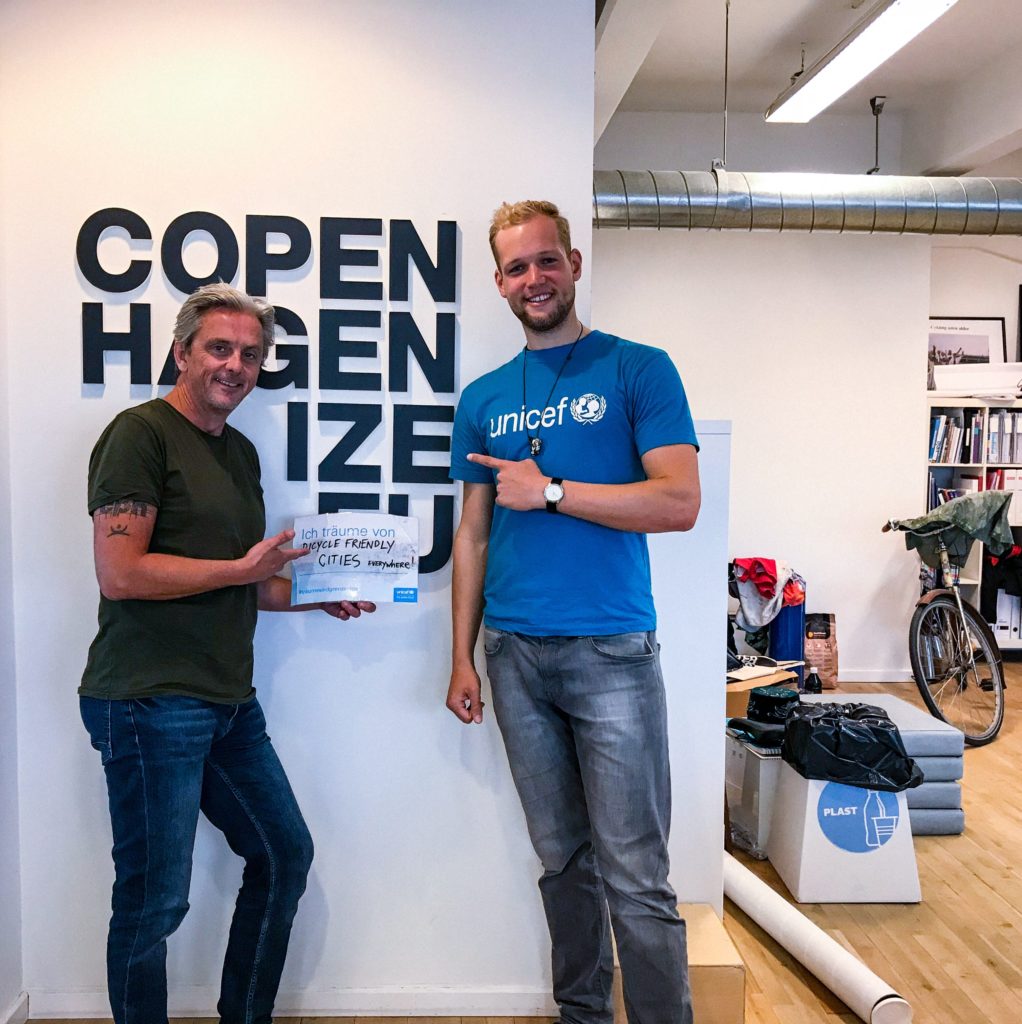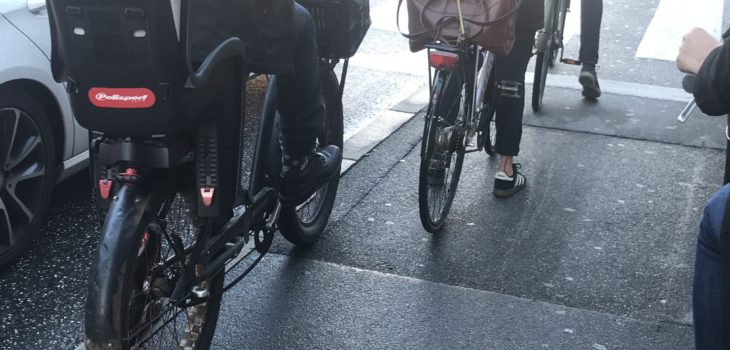
People call him the “Pope of Cycling Urbanism”. Who is behind that? I met Mikael Colville-Andersen in Copenhagen on my journey to Nordkapp. Mikael is a Canadian Dane with expertise in urban mobility. As I follow his work and TV series The Life Sized City with huge interest, of course I popped into his office of Copenhagenzie in Nordhavn like a real groupie without having an appointment. Again, I appreciate your willingness, Mikael, as you describe yourself online as an “impatient idealist”. Here we go…
Lukas: Thanks for joining the Bikingboundlessly project today! As we are both passionate about cycling, tell me about the field you are working in and how Copenhagenize works?
Mikael: What we do is consultations with cities around the world how to become more bicycle-friendly. We at Copenhagenize design their infrastructure, their networks and help them to promote cycling as well as how to talk about that topic properly. I mean not sporty cycling, but for regular citizens like you and me. Mainly we make cities bicycle-friendly.
I believe in the bicycle as a symbol for how we humans should do things better, but also as a powerful tool.
Lukas: Well, how did it all begin? Have you been a passionate cyclist yourself?
Mikael: Oh, that is the thing, I always keep on saying. I’m not a cyclist! I don’t give a damn about bicycles. I never learnt how to fix them and technically it doesn’t interests me. But I believe in the bicycle as a symbol for how we humans should do things better, but also as a powerful tool. In my opinion, it’s the most powerful tool to make our cities better. It’s like the forefront of the revolution. Everything else can follow that, but we have to have bicycles coming to our cities on profound infrastructure and then it’s just this fantastic domino effect!
Lukas: As a cyclist, I would call this status ideal! Where do your operations take place around the globe?
Mikael: We have offices here in Copenhagen, where you are right now. Then we have another bureau in Barcelona, Montreal and Brussels. So, we work globally, but a lot is focused in Copenhagen, because they [city council] have figured out how it [cycling infrastructure] should be – best practise. To sum up, we do operations all over the world. At the moment we work in Bordeaux, Paris, Straßbourg, cities in Russia, Detroit, Longbeach in California… so everywhere. Everyone wants a piece of this [knowledge] now. (laughing)
Lukas: Regarding the people that work for Copenhagenize, what’s their professional background?
Mikael: Primarily, we are urban planners, urban designers and landscape architects.
Lukas: Thinking of your vision, what was personally your biggest success so far in this business?
Mikael: (laughing) There’s too many, I can never decide on which one. Naming one success, when we put bicycles on the curriculum in schools of São Paulo, Brazil. We worked with these children, saw their enthusiasm and experienced their joy of cycling. Furthermore, we created save routes to school for them. The second example is more recent. Copenhagenize completely transformed a city in Russia, called Almetyevsk. The city major, the only guy in Russia who thought this idea, claimed that he wanted to become the most bicycle-friendly city in the country. Technically, I have to admit, they just went for it insistently! We told them exactly where to put the infrastructure and what did they do? They just built it! It became almost like sending text messages every day – now this street and this street, then that street… (laughing). In the end, everyone agrees that this is an amazing transformation in the heart of the Russian oil fields.
Lukas: How much time did this Russian project in Almetyevsk take?
Mikael: Oh, they did it quiet fast. It’s a small city of 160.000 people and they just build 50 km of the most modern bicycle infrastructure in the world in a six months period during summer and they doubled that plan for the next year. So, just imagine.. Almetyevsk went from nobody on bikes to 5% of the citizens with having the plan to hit 10% of their population in the next five years. That’s an insane success! We’ve also seen that differently. There are some cities in the world that do operations with us which are super slow doing baby steps. But then here we go with the Russian best practise example of Almetyevsk, boom. No excuses anymore. Nowadays, we receive calls from cities all over Russia and Kazakhstan. Again I refer to this domino effect – as soon as one city council did a transformational change and everyone will chase that move.
Lukas: What an outstanding example, wow! Coming to an end, as I cycle around the world collecting peoples dream, I would like to ask you this question: “What do you dream of?”
Mikael: Well, I think my dream is what I do every single day – making cities bicycle-friendly every day. I dream of having all cities with profound cycling infrastructure. We should keep in mind that our cities used to be bicycle friendly, before we shove the cars to our streets. I dream of having bicycle-friendly cities everywhere.
Lukas: Tusen takk.
